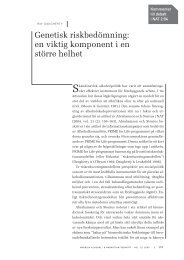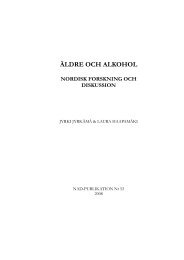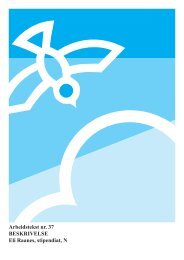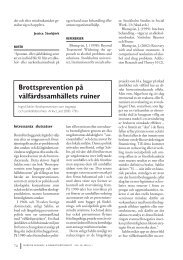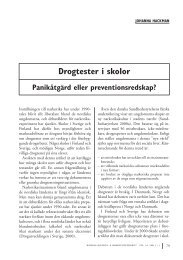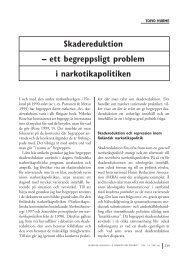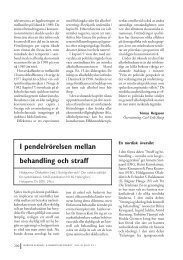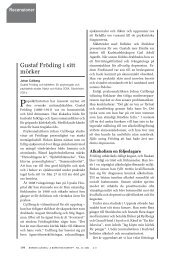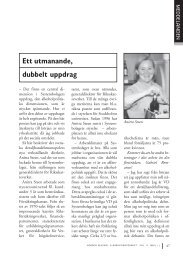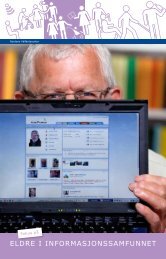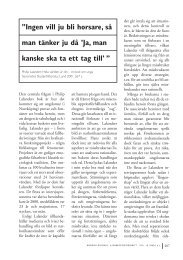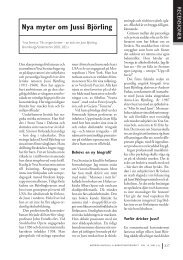Ladda ner publikationen - Nordens Välfärdscenter
Ladda ner publikationen - Nordens Välfärdscenter
Ladda ner publikationen - Nordens Välfärdscenter
Create successful ePaper yourself
Turn your PDF publications into a flip-book with our unique Google optimized e-Paper software.
104<br />
K A P I T T E L<br />
Sammendrag<br />
Summary<br />
ÖVERSÄTTNING: Magnus Gudnason<br />
Summary<br />
‘No limits’ are a key issue in<br />
this publication – if obstacles<br />
are removed, considerably<br />
more citizens in the Nordic<br />
countries will be able to participate<br />
in society, media, culture,<br />
sports and social life. Media<br />
and culture policy are the key<br />
issues. With regard to the<br />
considerable proportion of<br />
disabled people in the Nordic<br />
countries, people with disabilities<br />
are underrepresented in<br />
the media and within the<br />
arenas of cultural life.<br />
The media plays a leading normative<br />
role in our societies. Journalism<br />
can consolidate prejudice and<br />
reduce people – or challenge<br />
clichés and change people’s views<br />
of others and themselves. Therefore,<br />
it is important that the media<br />
image of people with disabilities is<br />
differentiated and nuanced.<br />
Sigrún Stefánsdóttir, director of<br />
programming at RÚV, the Icelandic<br />
public service radio and TV channel,<br />
believes it is her task to make<br />
sure that all people, regardless of<br />
physical and mental state, are<br />
portrayed with respect, both with<br />
regard to what unites us and our<br />
differences.<br />
By finding a place in the media,<br />
one becomes visible in public<br />
debate. That in turn can change<br />
the traditional views of a person<br />
or a whole group of persons in a<br />
similar life situation. Tare Teksum<br />
participated in the Norwegian<br />
TV-series «Ingen grenser» («No<br />
borders»), which became a turning<br />
point in his life. «I used to be<br />
lonely and isolated, I felt excluded.<br />
Now, everything is the opposite.<br />
I have friends, work, feel appreciated<br />
and wanted.»<br />
Use the media to challenge<br />
norms. Make sure the media<br />
reflects the diversity of our<br />
societies, not the simplicity.<br />
The Nordic countries have committed<br />
themselves to fulfill the UNconvention<br />
on human rights for<br />
people with disabilities. According<br />
to the convention, it is a basic<br />
democratic right to have access to<br />
media coverage as well as not<br />
being excluded from the possibility<br />
of participating in and producing<br />
media because of reduced functional<br />
capacity. The Nordic countries<br />
have also committed themselves to<br />
make sure that the media portrays<br />
people with disabilities in a varied<br />
way. At present, only the public<br />
service companies are under<br />
pressure from the state with<br />
regard to participation, accessibility<br />
and representation of people with<br />
disabilities.<br />
Geoff Adams-Spink is a disability<br />
correspondent at the BBC. He<br />
points out that actors and journalists<br />
with disabilities have to be<br />
portrayed on radio and TV in order<br />
to change norms. Here, the Nordic<br />
countries have a lot to learn from<br />
the outside world.<br />
The Nordic ministries of<br />
culture should request all<br />
media producers to achieve<br />
measurable goals of participation<br />
for people with disabilities,<br />
both with regard to access and<br />
media representation.<br />
Within the arena of culture, people<br />
with disabilities are underrepresented<br />
– this holds true for public<br />
and producers alike. In societal<br />
life, politics and administration,<br />
the disability movement puts on<br />
pressure in order to be represented.<br />
«Nothing About Us Without Us»<br />
is a slogan used by the European<br />
disability movement. In full, it<br />
means that no decisions should be<br />
made without consulting those<br />
involved, otherwise the countries<br />
risk making wrong decisions. This<br />
very much also applies to media<br />
development. Without participation<br />
from the disability movement, we<br />
will not be able to reform media<br />
policy.<br />
The cultural politicians of the<br />
countries, media firms and<br />
cultural institutions should get<br />
in dialogue with the disability<br />
movement and take on the<br />
responsi bility of including all<br />
people; irrespective of their<br />
physical and mental capabilities.<br />
1<br />
NVC<br />
anbefaler<br />
2<br />
Fakta<br />
3<br />
Fra<br />
virkeligheten<br />
4<br />
Politikk<br />
5<br />
Fra<br />
forskning<br />
6International<br />
utblick<br />
7<br />
Tips<br />
8Sammendrag<br />
Summary<br />
105



